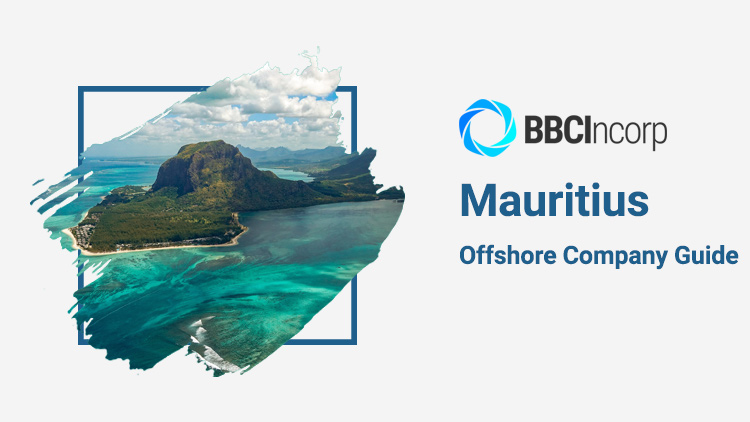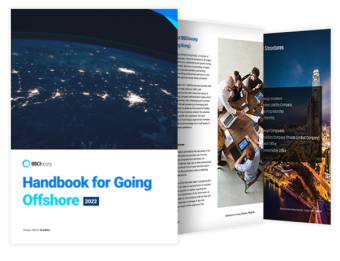
Located on the southeast coast of the African continent, Mauritius is an island nation that is surrounded almost entirely by a coral reef. Sounds perfect for a sunny holiday by the blue sea? But Mauritius is, in fact, known for its ideal business environment. It is what most investors look for when they decide to go offshore.
Doing business in Mauritius – A quick glance
During the past years, Mauritius has gone out of its way to gain a solid reputation as a secure and reliable investment destination when it comes to stable governance, transparency, ethics, economic, and political freedom.
There are several types of legal entities that are available to foreign investors inside of Mauritius, including Global Business Corporation (formerly known as GBC1), Authorized Company, Funds, Protected Cell Company, Limited Partnership, and Limited Life Company.
However, in this blog, we only dig into details with the two most popular types, which are Global Business Corporation and Authorized Company (both of them are offshore companies).
Perks of incorporating an offshore company in Mauritius
In order to attract more foreign investors coming to incorporate, Mauritius itself also brings a lot of temping advantages for businesses to conduct more smoothly than ever:
- The nation is considered to be one of among countries with the lowest tax systems in the world. Specifically, both corporate and individual income taxes in this country are both 15%.
- Taxes for offshore companies operating in Mauritius that don’t transact business with Mauritians or utilize their currency are excluded from Mauritius. Asset protection is guaranteed by Mauritius for investors.
- The offshore jurisdiction of Mauritius is just as favorable for conducting business as Panama, Liechtenstein, Jersey, and other comparable offshore jurisdictions.
- Access to major and emerging markets, particularly the US, is preferable for Mauritius.
- Permanent residence is available to foreign citizens who have lived in Mauritius for at least three years and are making an income above a minimum. As a permanent resident may only buy real estate on the island, this is necessary.
- The country’s prospects or growth are largely favorable. Additionally appropriate are the monetary and exchange rate policies, and even the net international reserves are deemed sufficient.
- The high level of privacy protection made possible by the flexibility of a business’s ownership structure is one of the main benefits of forming an offshore company in Mauritius.
- Since the island nation’s independence, the democratically elected government of Mauritius has experienced stability.
- There are several options to gain access to offshore banks in Mauritius and accounts in offshore banks that may be linked to Mauritius companies. Without having to go to the bank in person, you may create an offshore bank online.
Corporate taxation in Mauritius
Ass mentioned above, the tax rate in Mauritius is 15%. Nevertheless, depending on the nature of the business activities conducting and the resident’s situation, this rate might be significantly reduced. In Mauritius, those who meet the criteria to be considered “tax residents” are subject to tax on both their domestic and international income. Only income earned in or generated from the Republic of Mauritius is subject to taxation for non-residents.
The primary criterion is that a business is resident if it is formed in Mauritius or if its control and central management are situated in the nation. We’ll go into more depth when we explore each company structure.
Profits earned by a firm, including both active and passive revenue, are included in its taxable corporate income. The profit wouldn’t be taxed, nevertheless, if a Mauritian branch sent its earnings to a foreign headquarters. Furthermore, a firm can carry any losses forward for five years and deduct ordinary business costs from its taxable income. Annual allowances on capital expenditure losses may be carried over indefinitely.
In Mauritius, there are no capital gains taxes, and resident businesses may also exclude dividends received from local businesses. Dividends are not subject to any withholding taxes either. Although foreign dividends are taxed, the effective rate might be as low as 3% if a corporation takes use of the relevant credits.
Employers must contribute 6% to the National Pension Fund (NPF), 2.5% to the National Solidarity Fund (NSF), and 1.5% to the HRDC Levy for social security. Naturally, this only applies to businesses with Mauritius-based staff that are residents.
Every firm must submit annual tax returns and make quarterly tax payments. Within six months after the fiscal year end of a firm, the remaining tax obligations are due.
The withholding tax rate on royalties given to non-residents is 15%, however it can be completely removed for certain non-residents. Royalties paid to residents are subject to a rate of 10%. The Mauritius government is also attempting to improve the country’s IP rights protection.
Global Business Corporation (GBC) in Mauritius

The GBC (formerly known as GBC1) is registered under the Companies Act 2001 and licensed by the Financial Services Commission. Foreign investors mainly open a GBC in Mauritius to be used for Financial Services business (though it is subject to additional licenses) and for investment holding businesses (particularly when their overseas income is primarily from dividends, interest, and capital gains).
GBC is eligible for taking advantage of the Double Tax Agreements (DTA). This makes it a potent corporate vehicle for international tax planning.
Initial requirements to set up a Global Business Corporation in Mauritius
According to the law, a GBC must operate its core income-generating activities inside or from Mauritius. It means that a GBC must hire a reasonable number of employees, whether directly or indirectly, to carry out its business activities. Plus, it also has a minimum number of expenses in appropriate proportion to its activities.
A GBC must also be managed or controlled within Mauritius and more importantly, be administered by a Management Company – the middle man between a GBC and the FSC.
One thing to keep in mind, two local directors must be assigned (the minimum number of directors) and the BoD meetings must be organized in Mauritius.
The company is required carry out a registered office in Mauritius. Also, all of the documents such as accounting records, statutory documents must be kept in the office at all times.
It is vital to have a qualified company secretary (either firm or individual) who is a Mauritius resident.
A GBC also has to file and submit a return of income within 6 months after its accounting period ends, and of course, pay any payable taxes in that period. Likewise, an audited profit and loss account and balance sheet annually are compulsory. This has to be done within 6 months after the financial year ends. All accounts must be filed in accordance with international accounting standards. Plus, tax returns are needed to be submitted with Income Tax Authorities.
On top of all this, OECD’s widescale Base Erosion and Profit Shifting (BEPS) framework have also now come into play. As a result, the Mauritius Economic Substance rule was amended into the Income Tax Act which stipulates specifics as to how a GBC can comply with this new regime.
Popular uses of a GBC

As mentioned above, most of the GBC is used for financial management purposes. Some of the popular uses include:
- Asset management and Treasury management
- Credit finance
- Custodian services
- Leasing
- Factoring
- Occupational pension scheme
- Pension fund administrators and pension scheme management
- Retirement benefits scheme
- Registrar and transfer agent
- Etc
Authorized Company
The Authorized Company (AC) is introduced in the Finance Act 2018 (Miscellaneous Provisions). The Prime Minister and Minister of Finance and Economic Development decided to reform the Global Business sector. These reforms have been put in force and strengthen the Global Business sector while guaranteeing the compliance of Mauritius toward international standards (peculiarly OECD’s BEPS Action Plan).
The Authorized Company is a new type of company that has its business activities, as well as the control and management, are being carried out outside of Mauritius.
Authorized Company is viewed as a foreign company for tax planning purposes. And unlike the GBC, this type of legal entity doesn’t benefit from Double Tax Avoidance Agreements of Mauritius.
Initial requirements to set up an Authorized Company in Mauritius

The fundamental requirement to set up an AC in Mauritius is that the company must be detained or controlled by a person or a group who are non-resident. It means that the shares, voting rights, legal or beneficial interests are all controlled by the non-resident only.
Assigning a registered agent in Mauritius is also required when setting up an Authorized Company. This acts as a permanently-registered agent and is in charge of the administration of the AC. Here are its duties:
- File the return of income with the Mauritius Revenue Authority (MRA)
- File a financial summary with the FSC
- Safely store the records (including board minutes and resolutions, transaction records, and other documents as stated by the FSC)
- Tackle measures to prevent money laundering and terrorist financing, and any other similar offenses as stated by the FSC
However, the MRA issued a Statement of Practice to consider if a company is controlled and managed inside of Mauritius or not:
- The tactical decisions when it comes to fundamental activities are taken in or from Mauritius; and
- The majority of the BoD meetings are organized in Mauritius or The executive management of the company is regularly held in Mauritius
Popular uses of an Authorized Company

According to the law, an Authorized Company is eligible for doing business in the following categories:
- Investment holding and Property holding
- International Trading
- Management and Consultancy
- IT services
- Logistics
- Marketing
- Shipping and Ship management
- A one-off transaction using a Special Purpose Vehicle
Restricted Activities as an AC
And here is a list of restricted activities for AC according to the Fourth Schedule of the Financial Services Act 2007:
- Financial services (and of course, including banking)
- Any business activities involving a Collective Investment Scheme (or Fund) as a professional administrator
- Service Provider to other corporations in terms of registered office facilities, nominee, directorship, and secretarial
- Trusteeship services
Besides all the activities listed above, ACs are also not permitted to do any business that might cause harm to the reputation of Mauritius as an International Financial Centre, or go against the public interest.
A comparison between ACs and GBCs
These are the 2 most common offshore business entities in Mauritius. As one of the most progressive economies in the Africa region, Mauritius can be your ideal choice when going offshore.
Depending on the business category or your demand, you can opt for either Global Business Corporate or Authorized Company. The following is a quick comparison between the two entities.
| Authorized Companies (AC) | Global Business Companies (GBC) | |
|---|---|---|
| Having access to the Double Taxation Treaties network | No | Yes |
| Enlisting of a Registered Agent | Required | Not Required |
| Doing business locally | Not authorized | Authorized |
| Scope of business operation | Barred from engaging in certain activities (banking, financial services, holding/managing business funds, etc.) | Confined to the prescribed activities in the business plan |
Conclusion
Incorporating an offshore company in Mauritius involves taking the right steps to ensure the proper setup of your entity. BBCIncorp can consult and assist you along the way of incorporation, from the registration process to the very end, click here to find out now!
Free ebook
About to start an offshore business? This manual covers all you need to know when going offshore:
- Roadmap to offshore company formation
- How-to guide to offshore bank account registration
- Introduction to international rules in offshore landscapes

Disclaimer: While BBCIncorp strives to make the information on this website as timely and accurate as possible, the information itself is for reference purposes only. You should not substitute the information provided in this article for competent legal advice. Feel free to contact BBCIncorp’s customer services for advice on your specific cases.
Get helpful tips and info from our newsletter!
Stay in the know and be empowered with our strategic how-tos, resources, and guidelines.


